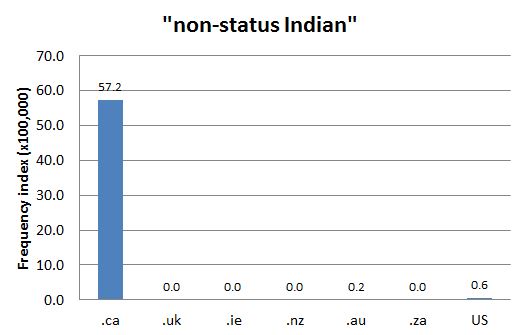DCHP-2
non-status Non-Status DCHP-2 (October 2016)
adj. & n. — Aboriginal, often in compounds, e.g. non-status Indian
a person with Indian ancestry who is not registered under the Indian Act.
Type: 4. Culturally Significant — The term non-status refers to Aboriginal people who "identify themselves as Indians but who are not entitled to registration on the Indian Register pursuant to the Indian Act" (see AANDC reference). Thus, non-status Indians are not qualified to receive the federal and provincial services that status Indians are entitled to. Together with its counterpart (see status), this term is a central part of Canada's legal Aboriginal terminology. A number of rights are derived depending on an individual's classification as status or non-status (see the 1972 quotation). The concepts are derived from the Indian Act (see Canadian Encyclopedia, s.v. "Indian Act", see Indian Act), which was first passed in 1876.
Changes of status can occur as a result of personal actions or through changes in the law. For example, prior to 1985, First Nations women lost their Indian status if they married a non-status Aboriginal man (see the 1980 and 1988 quotations). Bill C-31 sought to remove this discrimination and restore status and membership to those who had previously lost their status; however, this reinstatement of status includes a generational cut-off and does not cover all those who lost their status (see Bill C-31). As Chart 1 shows, the term is virtually limited to Canada.
Gage-5, s.v. "non-status", marks the term "Cdn.", ITP Nelson defines the term as someone "recognized by the Cdn. government", COD-2 lists the term unlabelled, but qualifies the definition as "(in Canada)".See also: Indian Act registered Indian status Bill C-31
- The terms status and registered are equivalent and used interchangeably, though the former is the more frequent variant today.
References:
- AANDC "Non-Status Indians" Accessed 20 May 2014
- COD-2
- Canadian Encyclopedia
- Gage-5
- ITP Nelson
Images:
Chart 1: Internet Domain Search, 20 May 2014
